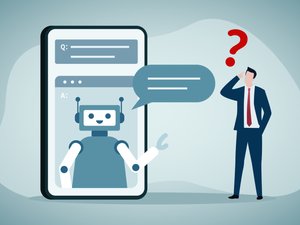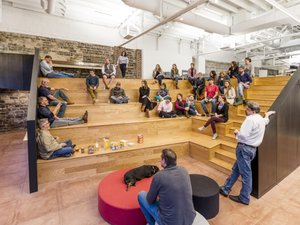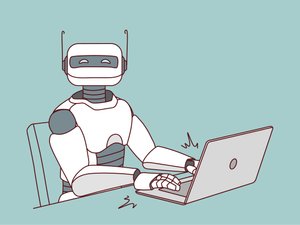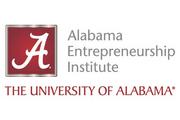With the nation buzzing from hype surrounding artificial intelligence, up-and-coming technology and innovation hub Birmingham is not getting left in the dust.
Rather, Birmingham-based tech startups, companies and programs are leveraging AI as a tool to overcome disparities and are even developing AI-enabled tech of their own.
Chris Sims, CEO and co-founder of startup CAVU and Sigao Studios, thinks AI can help level the startup playing field.
"Let's say you're a in a rural area and you have an idea for a startup," Sims said. "You're in a disadvantaged area that wouldn't necessarily have access to some of the resources you have even here in Birmingham. All of a sudden, you can compete on an international scale in a way that you never could you can get access to world-class marketing. You can afford it. So what (AI) could do when used right is make a more equitable startup economy, because people that normally didn't have the money or resources, all of a sudden do."
So, how does that work? Sims explained that tools such as ChatGPT and others enable his startup to get as much work done with a team of three full-time and one part-time employees as what once would have required a team of 10 professionals.
"That's very huge for us," Sims said. "I could pay $20 a month per person (for ChatGPT) and get access to all of the advanced expertise that I could possibly use as long as I know how to prompt the tool."
McCaul Baggett, CAVU chief agile officer and co-founder, said when the team first began integrating AI, it seemed like more of a spell check, but now, it's so much more.
"The ability of of AI to allow us to try a lot of things and not necessarily have to invest a ton — that is precisely the advantage that we've been looking for," Baggett said. "So at the startup level, it is particularly a helpful tool. ... I think we're gonna see a lot of startups showing up in Birmingham and I think, hopefully, you'll see a lot of them growing more quickly, because if people are thinking agilely about what it is they're trying to do and using AI to do it, it'll be a lot easier to find and then capture business as a small company."
Sims added, however, that the market will become tougher for businesses that do not have unique ideas.
But despite the powerful implications of AI, some have concerns. 'What if it replaces jobs or it not used responsibly?' are just some of the questions being raised.
Quelling fears
"You have to be careful when it comes to new technology and how the technology is explained, because AI, it's not new, but it's it's becoming mainstream, so there's an education responsibility there," said Donald Smith, CEO and founder of WorkTalo, a talent acquisition platform aiming to change the way hiring is done using AI.
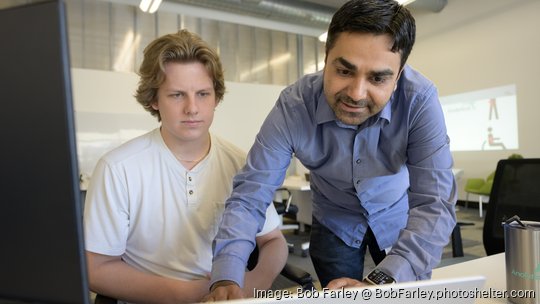
And some of the fears are not unfounded. Sims said AI likely will replace jobs in the near future, but it is not all doom and gloom.
"Technology has been doing this forever," he said. "You go back to the printing press. Before the printing press, you had monks whose job it was to copy the Bible over and over and over and then the printing press happened, and all of a sudden those jobs were no longer relevant. You look at every major industrial revolution. All of a sudden we had more automation, we didn't need as many craftsmen specializing in things as before.
"Technology is all about replacing old jobs, however it is replacing them with new jobs. So as a startup, I'm able to do things that I would never be able to afford. It's not so much that we're not hiring people. It's that we could never afford to hire those people to begin with. And now as a small startup, I'm no longer as disadvantaged. I have access to things that large companies would spend lots of money to go do. Now I can do that."
Joshua Jones, CEO of QuantHub, concurred.
"There has been a lot of talk of AI replacing jobs," he said. "For companies that have thousands of employees, I understand how this might come to mind, but for scaling early-stage software companies, we see it rather as a workforce multiplier. We’re hiring as fast as we can, and we see AI as a way to accomplish more, faster. We will continue to develop and invest in large language models and generative AI, and expect this to be a true accelerant in our go-to-market strategy."
Sims said the workforce implications of AI are that employers can hire people earlier in their careers as well, as AI will enable them to do the same work as a more experienced employee. This could reduce the cost of labor, he said.
Opportunities
While the general consensus seems to be that AI offers more opportunity than danger, it can be hard to visualize its impact with the mainstream application of the tech being so new.
"I think the bigger point is that, if you're a legacy organization, right now's a great time to figure out how to enable your business with AI and productize and launch AI-powered businesses that would either enhance your industry or just enhance a different sort of market opportunity or capture market opportunity there," said Patrick Cooney, managing partner at Mark Two Ventures.
And while the opportunity is there, some feel Birmingham is not quite ready to seize it.
"Unfortunately we don’t have nearly the trained workforce we need in this area," Jones said. "First of all, I do want to applaud Daniel Coleman and the team at Birmingham-Southern for launching a summer data science camp. (The University of Alabama at Birmingham) and Samford also have programs for data science, and these are critical for the supply side of the equation, but it’s not nearly enough to meet the demand we see in the market."
QuantHub recently surveyed 100 business leaders and executives on topics related to generative AI, Jones said. Seventy-nine percent of respondents “agreed” or “strongly agreed” with the statement, “Generative AI will have a meaningful impact in my industry in the coming months,” and 43% of respondents said that it already has impacted their industry.
"Everyone has heard the cocktail party version of how ChatGPT can impress, but I think there is more opportunity for discourse on practical and tangible ways that people are using it today. For example, many advertisers and creatives are using Midjourney to create images in minutes that previously took hours," he said. "I’ve talked to executives who use Bard and Chat GPT to do strategic planning. What are other ways that members of the Birmingham business community are leveraging these new tools to be productive?"
Leaders should think less about whether AI will replace jobs, he added, and more about how it can be used to find minor productivity gains.
